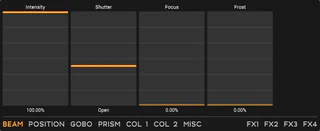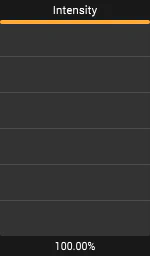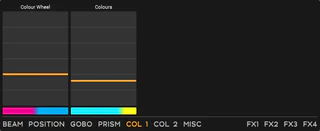Controls
The fixture controls enable you to assign a unique identity to each preset. When one or more fixtures are selected, any changes made to the fixture controls are stored in the current step of the preset.
To make controls easy to locate, they are organized into relevant pages. You can access each page using the tabs at the bottom of the controls section.

Control Strip

Most of the controls in Showglo Plugin use a control strip to set fixture values. The control strip represents values from 0% at the bottom to 100% at the top. When one or more relevant fixtures are selected, you will see a bar for each fixture, indicating its current value. If you have already added control values to the current step, these values will also be shown.
Above the control strip is a label showing the control name, and below it is a label providing information about the current control value. There are several ways to interact with control strips to achieve the desired result.
Click
When one or more relevant fixtures are selected, clicking anywhere on the control strip will store the current control value of each fixture to the selected step.
Click & Drag (Up/Down)
When one or more relevant fixtures are selected, clicking and dragging up or down will adjust the value for each fixture. Dragging upwards increases the value, while dragging downwards decreases it. All value changes will be stored in the currently selected step once the drag operation is complete.
Ctrl + Click
Holding the Ctrl key while clicking on the control strip will set all selected fixtures to the same value. The value is determined by the position of the click, ranging from 0% at the bottom to 100% at the top. You can adjust the value by dragging up or down.
Right Click (Context Menu)
You can open the control’s context menu by right-clicking on the control strip. This provides the following options in relation to the control and the current step:
- Select Fixtures: Select fixtures using this control on the current step.
- Clear Values: Clear control values from the current step.
- Clear Values From Selected Fixtures: Clear control values from the current step for selected fixtures only.
- Clear Values From Unselected Fixtures: Clear control values from the current step for unselected fixtures only.
Beam Controls
The beam controls can be accessed by clicking the BEAM tab at the bottom of the control panel.
Intensity
Intensity controls the brightness of the light. Adjusting the intensity allows you to set the desired level of illumination, from a subtle glow to a powerful beam.
Shutter
Shutter controls the opening and closing of the light beam. It can be used to create strobe or flashing effects, or cut off light abruptly.
Zoom
Zoom adjusts the width of the light beam. It allows you to change the beam from a narrow, focused point to a wide, expansive wash.
Focus
Focus fine-tunes the sharpness of the light beam. It helps in achieving a crisp, defined edge or a softer, more diffused light.
Iris
Iris controls the diameter of the beam. It can make the beam smaller and more focused or larger and more spread out, similar to adjusting the aperture in a camera lens.
Frost
Frost adds a diffusing effect to the light beam. It softens the edges and creates a more blended, smooth wash of light, reducing harsh shadows and highlights.
Position Controls
The position controls can be accessed by clicking the POSITION tab at the bottom of the control panel.
Pan & Tilt
Pan & Tilt controls the horizontal (pan) and vertical (tilt) movement of the light fixture. These controls allow you to direct the light beam precisely, enabling dynamic positioning and movement across the stage or venue.

The Pan & Tilt section offers three controls: a control strip at the bottom for pan adjustments, a control strip on the left for tilt adjustments, and a large panel for controlling both pan and tilt simultaneously. Pan adjustments are made by dragging the mouse horizontally (left or right), and tilt adjustments are made by moving the mouse vertically (up or down).
Pitch
Pitch adjusts the angle of the light beam relative to its mounting position.
Motion Speed
Motion Speed sets the speed at which the light fixture moves when performing pan, tilt and other positioning adjustments. It allows for smooth, slow movements or quick, sharp transitions, depending on the desired effect.
Continuous Pan
Continuous Pan enables the light fixture to rotate endlessly in the horizontal plane. This control is ideal for creating sweeping, continuous motion effects.
Continuous Tilt
Continuous Tilt allows the light fixture to rotate endlessly in the vertical plane. Like continuous pan, this control is perfect for generating uninterrupted vertical motion.
Gobo Controls
The gobo controls can be accessed by clicking the GOBO tab at the bottom of the control panel.
Gobo
Gobo refers to a stencil or template placed inside or in front of a light source to control the shape of the emitted light. It allows you to project patterns, textures, or images onto surfaces.
Gobo Rotate
Gobo Rotate enables the rotation of the gobo within the light fixture. This control allows you to position or spin the projected pattern or image.
Prism Controls
The prism controls can be accessed by clicking the PRISM tab at the bottom of the control panel.
Prism
Prism adds a prism effect to the light beam, splitting it into multiple beams or creating unique optical effects.
Prism Rotate
Prism Rotate enables the rotation of the prism within the light fixture.
Colour Controls 1
The colour 1 controls can be accessed by clicking the COL 1 tab at the bottom of the control panel.

Colour Wheel
Colour Wheel allows you to select different colours by rotating a wheel within the light fixture.
Colour Macro
Colour Macro offers pre-programmed color effects and transitions.
Colour Controls 2
The colour 2 controls can be accessed by clicking the COL 2 tab at the bottom of the control panel.
Colour Temperature
Colour Temperature adjusts the warmth or coolness of the light. This control allows you to change the light’s appearance from a warm, yellowish tone to a cool, bluish tone.
Colour Tint
Colour Tint fine-tunes the color balance of the light, specifically adjusting the level of green. This control is used to subtly correct for specific lighting conditions or achieve a particular visual style.
Hue & Saturation
Hue & Saturation provides control over the specific shade and intensity of the color. Hue adjusts the color itself (such as red, green, or blue), while Saturation controls how vivid the colour is compared to white.

Hue adjustments are made by dragging the mouse horizontally (left or right), and saturation is controlled by dragging the mouse vertically (up or down).
Miscellaneous Controls
The miscellaneous controls can be accessed by clicking the MISC tab at the bottom of the control panel.
Pump
Pump controls the operation of any internal fluid or air pumps within the lighting fixture. This is often used for effects such as fog, haze, or other atmospheric effects.
Fan
Fan controls the fixtures built-in fans used for dispersion of haze and other atmospheric effects as well as cooling fans to prevent overheating.
Miscellaneous
Miscellaneous encompasses other various controls that do not fit into any of the other categories. This can include additional effect parameters, unique features of the fixture, or any custom settings that are provided by your fixture.
